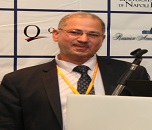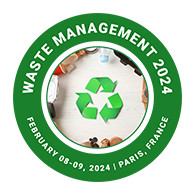Sessions/Tracks
Session 01: Solid Waste Management
Solid waste management is of utmost importance as it plays a vital role in environmental protection, public health, and resource conservation. Effective waste management practices help minimize pollution, safeguard ecosystems, and preserve natural resources. They also prevent the spread of diseases, promote sanitation, and ensure clean living conditions. Additionally, proper waste management promotes resource recovery through recycling and composting, contributing to a circular economy and sustainable development. By prioritizing solid waste management, we can create a cleaner, healthier, and more sustainable future for all.
-
Waste Generation
-
Waste Segregation
-
Waste Collection and Transportation
-
Waste Treatment and Disposal
-
Hazardous Waste Management
Waste Management Conference | Climate Change Congress | Recycling and Upcycling Congress
Session 02: Plastic Pollution
Plastic pollution is a pressing global issue with significant importance. It poses severe threats to our environment, marine life, and human health. Plastic waste persists in the environment for hundreds of years, causing widespread pollution in our oceans, rivers, and landfills. It endangers marine species, as they can ingest or become entangled in plastic debris. Moreover, micro plastics, tiny particles derived from the breakdown of larger plastic items, have been found in the food chain, raising concerns about potential health risks. Addressing plastic pollution is crucial for preserving ecosystems, safeguarding biodiversity, and ensuring a sustainable future for generations to come. It requires concerted efforts to reduce plastic consumption, promote recycling and waste management, and advocate for innovative solutions to tackle this global challenge.
-
Plastic Waste Generation
-
Environmental Impact
-
Marine Plastic Pollution
-
Micro plastics
-
Plastic Alternatives and Innovation
Waste Management Meeting | Global Warming Summit | Bio Energy and Biofuels Conference
Session 03: Waste Treatment
Waste treatment plays a crucial role in managing and minimizing the impact of waste on the environment and human health. Through various treatment processes, such as recycling, composting, incineration, and landfill management, waste can be effectively managed and processed. Recycling allows valuable materials to be recovered, reducing the need for new resource extraction. Composting transforms organic waste into nutrient-rich soil amendments, promoting sustainable agriculture and reducing the reliance on chemical fertilizers. Incineration, when properly controlled, can generate energy from waste while reducing its volume.
-
Waste-to-Energy Conversion
-
Biological Waste Treatment
-
Emerging Technologies
-
Waste Minimization and Source Reduction
-
Organic Waste Treatment
Environmental pollution Conference | Ecosystem Congress | Global Warming Event
Session 04: E-waste management
E-waste management is the responsible handling and disposal of electronic waste, which includes discarded electronic devices like computers, mobile phones, televisions, and appliances. It is essential due to the hazardous components present in electronic waste, such as heavy metals and toxic chemicals, which can contaminate the environment if not properly managed. Effective e-waste management involves practices like recycling, refurbishment, and safe disposal to minimize environmental pollution, conserve valuable resources, and prevent potential health risks associated with improper handling of e-waste. By implementing proper e-waste management measures, we can promote sustainability, reduce the environmental footprint, and create a safer and healthier environment for all.
Environmental Toxicology Congress | Environmental Science Event | Climate Change Meet
Session 05: Recycling and Upcycling
Both recycling and upcycling play vital roles in the circular economy, where resources are kept in use for as long as possible, and waste is minimized. These practices contribute to reducing the consumption of finite resources, decreasing pollution and greenhouse gas emissions, and fostering a more sustainable and environmentally conscious society. By participating in recycling programs and embracing upcycling initiatives, individuals, businesses, and communities can make a positive impact on the environment and work towards a more sustainable future.
-
Recycling Technologies
-
Recyclability
-
Recycling Education and Awareness
-
Upcycled Design
-
Upcycled Art and Craftsmanship
-
Upcycling Entrepreneurship
Waste Management Event | Global Warming Congress | Climate Change Meeting
Session 06: Waste Water Treatments
Wastewater treatment is a critical process that involves the removal of pollutants and contaminants from wastewater before it is discharged back into the environment or reused. Wastewater treatment is of utmost importance as it protects the environment, ensures public health, conserves water resources, and promotes sustainable practices. Implementing effective and efficient wastewater treatment processes is crucial for creating a cleaner and healthier future for our communities and the planet as a whole. By treating wastewater, we can prevent water pollution, reduce the risk of waterborne diseases, conserve water resources, and comply with environmental regulations. Effective wastewater treatment is essential for creating a sustainable and healthy environment for present and future generations.
-
Physical water treatment
-
Biological water treatment
-
Chemical treatment
-
Sludge treatment
-
Advanced Treatment Technologies
-
Wastewater Reuse and Resource Recovery
Waste Management Summit | Climate Change Conference | Pollution and Health Effects Meeting
Session 07: Waste to Energy
Waste to energy offers an effective solution to manage waste, reduce landfill usage, and generate renewable energy. By converting waste into valuable energy resources, it contributes to resource conservation, greenhouse gas emission reduction, and the transition towards a more sustainable energy future. Waste to energy is an innovative and sustainable approach that involves converting various types of waste materials into usable forms of energy.
-
Resource Utilization
-
Renewable Energy Generation
-
Waste Volume Reduction
-
Greenhouse Gas Emission Reduction
-
Circular Economy Approach
-
Local Energy Production
Bioenergy and biofuels Conference | Waste Treatment Conference | Environmental Toxicology Meeting
Session 08: Renewable Resources and Renewable Energy
Renewable resources refer to natural resources that are replenished or regenerated over time, making them practically inexhaustible. These resources include sunlight, wind, water (hydroelectric power), biomass, and geothermal heat. Unlike finite resources such as fossil fuels, renewable resources can be harnessed continuously without depleting the source.
Renewable energy, on the other hand, is the energy derived from these renewable resources. It refers to energy generated from sources that are naturally replenished and have minimal impact on the environment. Renewable energy technologies include solar photovoltaic (PV) systems, wind turbines, hydroelectric power plants, biomass energy systems, and geothermal power plants.
-
Climate Change Mitigation
-
Energy Security and Independence
-
Sustainable Development
-
Environmental Benefits
-
Energy Transition and Innovation
Recycling and Upcycling meeting | Global warming Conference | Waste Management Congress
Session 09: Landfills
Landfills are designated areas where solid waste is disposed of and managed. They play a significant role in waste management systems, but their use raises several environmental and health concerns. Landfills are designed to safely store and isolate waste from the surrounding environment. The waste is compacted and buried in layers, with a liner at the bottom to prevent contamination of groundwater. While landfills continue to be a part of waste management strategies, the focus is shifting towards waste reduction, recycling, and the development of alternative waste treatment technologies. By embracing sustainable waste management practices, we can minimize the reliance on landfills and work towards a more environmentally friendly and resource-efficient approach to waste disposal.
-
Municipal Solid Waste Landfills
-
Industrial Waste Landfills
-
Hazardous Waste Landfills
-
Green Waste Landfills
Waste Management conference | Biodiversity Conservation Event | Global Warming Meeting
Session 10: Environmental Pollution
Environmental pollution has far-reaching consequences, but efforts are being made globally to address and mitigate its impact. These include implementing stricter regulations and standards, promoting sustainable practices, adopting cleaner technologies, improving waste management systems, and raising awareness about the importance of environmental protection. Through collective efforts, we can work towards reducing pollution levels, preserving natural resources, and creating a healthier and more sustainable environment for present and future generations.
-
Air pollution
-
Water pollution
-
Land Pollution
-
Soil Pollution
-
Noise Pollution
-
Thermal Pollution
-
Industrial Pollution
-
Light Pollution
Climate Change and Sustainability Congress | Waste Management Conference | E-Waste Management Conclave
Session 11: Socio-environmental impacts of waste management
Waste management has significant socio-environmental impacts that extend beyond the direct management of waste. Improper waste disposal can lead to environmental pollution, including air, water, and soil contamination, which can harm ecosystems and public health. Inadequate waste management practices often disproportionately affect marginalized communities, leading to environmental injustice. Furthermore, resource depletion and the loss of valuable materials occur when waste is not properly managed. However, effective waste management systems can create economic opportunities, promote social equity, and contribute to a healthier environment. By implementing sustainable waste management practices, such as recycling, resource recovery, and community engagement, we can mitigate the negative socio-environmental impacts and work towards a more sustainable and inclusive future.
Waste Management Conference | Ecosystems and Ecology Meeting | Climate Change Seminar
Session 12: Bioenergy and Biofuels
Bioenergy and biofuels are renewable energy sources derived from organic matter, such as plants, crops, and agricultural waste. They play a vital role in transitioning to a low-carbon economy and reducing dependence on fossil fuels. Bioenergy refers to the production of heat, electricity, or biogas through the combustion or conversion of biomass. Biofuels, on the other hand, are liquid or gaseous fuels derived from biomass and can be used as substitutes for conventional fossil fuels in transportation. Bioenergy and biofuels offer several advantages, including reduced greenhouse gas emissions, as the carbon released during their combustion is offset by the carbon absorbed during plant growth
-
Biofuel Production Technologies
-
Biomass Feedstock and Supply Chain
-
Bioenergy Systems and Applications
-
Bioenergy Policies and Regulations
-
Bioenergy and Climate Change
-
Bioenergy Economics and Market Trends
-
Sustainability and Environmental Impacts
Waste Management Conclave | Renewable and Non-renewable Seminar | Climate Change Symposium
Session 13: Advanced technologies in waste management
Advanced technologies in waste management are revolutionizing the way we handle and process waste, offering more efficient, sustainable, and environmentally friendly solutions. These technologies leverage innovation and scientific advancements to address the challenges associated with waste generation, disposal, and resource recovery. The adoption of advanced waste management technologies is crucial for addressing the challenges of waste management, reducing environmental pollution, conserving resources, and moving towards a more sustainable future. These technologies offer innovative and effective solutions to optimize waste management processes, maximize resource recovery, and minimize the environmental footprint of waste disposal.
-
Waste-to-Energy Technologies
-
Advanced Recycling Technologies
-
Smart Waste Management Systems
-
Bioremediation and Biological Waste Treatment
-
Advanced Waste Sorting and Separation
-
Sustainable Waste Management Practices
-
Innovative Waste Treatment
Waste Management Meeting | Climate Change Conclave | Waste Management Convention
Session 14: Environmental Remediation
Environmental remediation is the process of restoring contaminated or degraded environments to a cleaner, healthier, and more sustainable state. It involves the removal, containment, or treatment of pollutants and contaminants in soil, water, air, or other environmental media. Environmental remediation is essential for mitigating the adverse impacts of human activities, industrial processes, and natural disasters on ecosystems and human health. It employs various techniques, such as excavation and soil removal, bioremediation, chemical treatments, and containment systems, to address different types of pollution and contamination. By removing or reducing pollutants, restoring ecological balance, and safeguarding human health, environmental remediation contributes to the protection and preservation of natural resources, the restoration of ecosystem functions, and the promotion of sustainable development.
-
Soil remediation
-
Groundwater remediation
-
Surface water remediation
-
Sediment remediation
-
Brownfield Remediation
-
Remediation Technologies and Innovations
-
Ecological Restoration
Waste Management Convention | Global Warming Event | Environmental Toxicology Congress
Session 15: Biomedical and Infectious Waste Management
Proper management of biomedical and infectious waste is essential to prevent the spread of infections, protect healthcare workers, and minimize the environmental impact. It involves adhering to strict guidelines and regulations to ensure the safe and responsible handling and disposal of such waste. It ensures the safety of healthcare workers, waste handlers, and the general public by minimizing exposure to hazardous materials. Additionally, it contributes to sustainable waste management practices by promoting recycling, waste reduction, and the use of environmentally friendly treatment technologies. Effective management of biomedical and infectious waste requires collaboration between healthcare facilities, waste management authorities, regulatory agencies, and other stakeholders to ensure compliance with guidelines and regulations, and to continuously improve waste management practices.
-
Regulatory Frameworks and Guidelines
-
Waste Segregation and Packaging
-
Waste Collection and Transportation
-
Treatment Technologies
-
Disposal Methods and Facilities
-
Occupational Safety and Training
Hazardous Waste Congress | Pollution Control Seminar | Waste Treatment summit
Session 16: Thermal Waste Recovery
The importance of thermal waste recovery lies in its ability to reduce the volume of waste sent to landfills while simultaneously generating sustainable energy. This contributes to waste management practices that prioritize resource recovery and environmental sustainability. By diverting waste from landfills, thermal waste recovery helps to mitigate greenhouse gas emissions and reduce the strain on limited landfill space. Additionally, thermal waste recovery can contribute to the production of renewable energy, reducing reliance on fossil fuels and supporting the transition to a low-carbon economy.
Waste Management Conference | Climate Change Meeting | Global Warming Congress
Session 17: Waste governance, regulations and policies
Waste governance, regulations, and policies are crucial aspects of managing and controlling waste to protect public health, preserve the environment, and promote sustainable development. These measures are implemented at various levels, including international, national, regional, and local, and involve a combination of laws, regulations, guidelines, and enforcement mechanisms. It's important to note that waste governance, regulations, and policies can vary significantly between countries and regions. Therefore, specific details and approaches may differ depending on the jurisdiction you are referring to.
-
Waste Hierarchy
-
Extended Producer Responsibility
-
Waste Minimization and Recycling Targets
-
Waste Permits and Licensing
-
Hazardous Waste Regulations
-
Public Participation and Awareness
Climate Change Meeting | Global Warming Congress | E-Waste Management Conference
Session 18: Pollution Control Technologies
Pollution control technologies play a vital role in mitigating the harmful effects of pollution on the environment and human health. These technologies encompass a wide range of methods and systems designed to reduce or eliminate the release of pollutants into the air, water, and soil. They include air pollution control devices like electrostatic precipitators and flue gas desulfurization systems, wastewater treatment processes, waste management techniques such as recycling and landfill gas collection, noise reduction measures, and renewable energy systems like solar power and wind turbines. By employing these technologies, we can minimize pollution levels, protect ecosystems, and work towards a more sustainable and healthier future for all.
-
Air Pollution Control
-
Water Pollution Control
-
Solid Waste Management
-
Noise Pollution Control
-
Hazardous Waste Management
-
Renewable Energy
-
Green Technologies
Waste Management Conference | Climate Change On-stream | Global Warming Event
Session 19: Biological Reprocessing
Biological reprocessing is a waste management approach that utilizes biological processes to treat organic waste and convert it into useful products. It involves the decomposition of organic materials by microorganisms, such as bacteria and fungi, through processes like composting and anaerobic digestion. Anaerobic digestion, on the other hand, occurs in the absence of oxygen and produces biogas, a mixture of methane and carbon dioxide, which can be used as a renewable energy source. Biological reprocessing is an environmentally sustainable method that not only reduces waste volumes but also helps divert organic waste from landfills, mitigates greenhouse gas emissions, and produces valuable resources for agricultural and energy applications.
-
Anaerobic Digestion
-
Bioenergy Production
-
Bio fertilizers and Soil Amendments
-
Liquid Organic Fertilizers
-
Waste Valorization and Resource Recovery
Waste Management Meeting | Environmental Science Event | Global Warming Congress
Session 20: Animal Feed
Animal feed refers to the food given to animals, such as livestock, poultry, and aquaculture species, to support their growth, health, and overall well-being. It plays a critical role in the livestock industry by providing essential nutrients, including proteins, carbohydrates, fats, vitamins, and minerals. Animal feed can be formulated using a combination of ingredients, including grains, oilseeds, forages, and by-products from the food and agriculture industries. The feed industry ensures that animal feeds are properly balanced and meet the nutritional requirements of different animal species at different life stages. Feed Ingredients
-
Feed Formulation and Nutrient Balancing
-
Feed Manufacturing and Processing
-
Specialty Feeds
-
Feed Safety and Quality Assurance
Waste Management Conference | Climate Change Meeting | Bio Energy and Biofuels Summit
Session 21: Waste management in developing countries
Waste management in developing countries poses unique challenges and requires tailored approaches to address the specific conditions and constraints present in these regions. Unlike developed countries, developing nations often face limited resources, inadequate infrastructure, and rapid urbanization, which can exacerbate the waste management crisis. One of the key importance of waste management in developing countries is the protection of public health and the environment. Inadequate waste management practices can lead to the spread of diseases, water contamination, air pollution, and environmental degradation.
Environmental Toxicology Congress | E-waste management Conference | Recycling and Upcycling Conference
Session 22: Waste Collection and Segregation Techniques
Effective waste collection and segregation techniques are crucial for proper waste management and play a significant role in maximizing resource recovery, reducing environmental pollution, and promoting sustainable practices. By implementing these waste collection and segregation techniques, communities and waste management authorities can enhance the effectiveness of waste management systems, increase recycling rates, minimize waste sent to landfills, and promote sustainable practices. It requires a combination of infrastructure development, public engagement, policy support, and ongoing monitoring and evaluation to ensure the success of these techniques.
-
Source Segregation Methods
-
Collection System Optimization
-
Technology and Automation in Waste Sorting
-
Bin Design and Color Coding
Environmental Pollution Conference | Climate Change Event | Global Warming Congress












